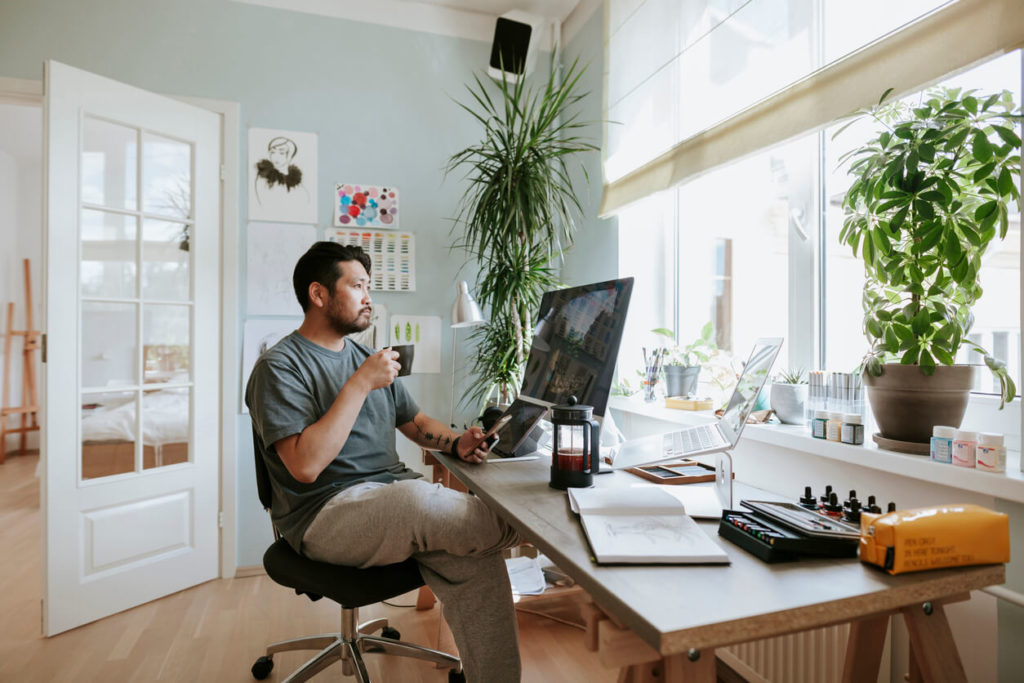While working from home became the norm for many workers during the pandemic, many freelancers have already been working remotely for years. It’s predicted that by the year 2027, roughly 50% of US workers will be freelancers.
The pandemic forced many employees who used to work in the office to get a taste of the freelance lifestyle.
Although there are many benefits associated with working from home — like saving money on eating out or working in a comfortable environment — there are also hidden health risks, both physical and mental.
With less social interaction throughout the day and the need to be “always on,” working from home can create feelings of isolation or burnout. And without having to walk during the day, weight gain along with back pain can creep in unexpectedly.
These health risks may be new problems for those who recently started working from home, but they’re problems those with freelancer jobs should always be aware of.
Since freelancers cover their own self-employed health insurance, it’s even more important to stay on top of your health to prevent costly health problems.
Read on to learn about the hidden health risks for freelancers and what you can do to prevent them.
Hidden Health Risks for Freelancers
Save money on health care and live a more comfortable, healthy life with these preventive solutions for freelancers.
1. Burnout
Creating a work/life balance can be a common issue for freelancers. This is true whether you work from home or not. This can happen even in a co-working space since you may still be isolated from your team.
45% of people working from home have said they suffer from burnout. Remote workers stated they feel obligated to work more than when they’re in the office — including replying to emails after hours.
How to Prevent It:
Take a step back and evaluate your work schedule and environment. Set yourself a strict work schedule, and set boundaries for your personal life. Separate your work space from where you spend your down time.
2. Weight Gain
While working remotely may create more time or space to make healthy meals, it can be easy to reach for snacks or eat unhealthy food that are within reach in your home.
How to Prevent It:
Create a structured eating schedule the same way you would if you were working in an office environment. Plan your meals in advance, and prepare them over the weekend if possible. When you have healthy meals already available, you won’t need to snack as much.
It’s also a good idea to exercise or go for short walks to add some movement to your day, even when you think you don’t have time. The best way to ensure walking becomes a part of your workday is to pencil it into your schedule.
You can take a 30-minute walk before or after work or squeeze in three 10-minute walks in the morning, afternoon, or evening.
Learn more about how to add movement to your workday with these tips >
3. Isolation and Depression
For many freelancers, work is a main source of social interaction throughout the week. If you’re working at home for weeks or months on end, it can become increasingly lonely and isolating. This isolation can eventually turn into depression.
How to Prevent It:
It’s important to make changes in your work day to incorporate social activity. Scheduling coffee breaks, lunch dates, or after work drinks with friends throughout the week is a great start.
If you feel the need to get out of your house and interact daily with other freelancers, join a co-working space in your area. This will give you an office environment where you’ll be around other people throughout your day — and maybe even make some friends!
4. Sore Joints and Back Pain
Sitting in front of a computer for 8+ hours a day can be hard on your back, muscles, and joints. No matter where you’re working — at home, an office, or a café — this is something that should be considered.
Whether you have any pains now or not, getting ahead of prevention can ensure less back and joint issues in the future, along with less healthcare expenses.
How to Prevent It:
Create an ergonomic work station that encourages you to sit up straight, including a comfortable office chair and adjustable desk.
Be sure to maintain good posture throughout the day while you’re sitting at your desk: Keep your feet flat on the ground without crossing your legs, keep your shoulders and neck relaxed, and keep your back straight against the chair.
If you’re sitting at your desk all day, schedule short breaks to walk and stretch your muscles. You can even take a few minutes each hour or so to do easy exercises while at your desk.
Freelancer Healthcare
There are many pros and cons of gig economy, but freelancer health insurance might be at the top of the cons list.
Freelancers are often left to fend for themselves in managing preventive health care and health insurance. Having to cover your own self-employed health insurance means it’s even more important to stay on top of your health and prevent health problems rather than treating them.
Health insurance for independent contractors can be difficult to manage — it can be expensive and lack the coverage you might be hoping for. myCallADoc telemedicine services can help freelancers maintain quality, convenient, and affordable health care.
Without health insurance, it’s easy to postpone a regular visit to the doctor or skip it completely. But avoiding preventative care can lead to serious health issues in the long term, which means much higher costs.
That’s why preventative care for freelancers is important, even if it doesn’t feel urgent in the moment.
At myCallADoc, we want you to have convenient, affordable, and reliable health care. We pride ourselves on providing the future of healthcare: virtual telemedicine services straight to your smartphone, tablet, or laptop.
With the convenience and affordability of myCallADoc, it’s a great option for self-employed health insurance which allows you access to preventative care.
Save money and keep yourself healthy with myCallADoc >
Stay Active as a Freelancer
To prevent the hidden health risks of working as a freelancer, establishing a routine for your day can set you on the right track. Prepping healthy meals, planning activity breaks, and having social interactions can help with burnout, weight gain, bad posture, and feelings of isolation.
A great way to reduce stress and feel more grounded is a daily exercise regimen. Even just getting outside to walk for 30 minutes a day can improve cardiovascular strength, reduce stress, and lift your mood.
There are different ways to build more activity into your day while you’re working. It’s just a matter of getting creative and being intentional!
Try out these easy ways to add activity into your workday >



